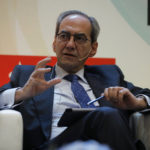“Latin America is at a turning point”
In 2017, Latin America will manage to grow again, at a rate of about 1.5%, after five years of economic slowdown, said this Thursday BBVA’s Executive Board Director speaking at the Latibex Forum. During his address in the opening day of the annual event, José Manuel González-Páramo noted that “Latin America is at a turning point”.

In a round table focusing on the role of businesses in driving growth in Latin America, José Manuel González-Páramo shared his insights into the region's prospects. In his opinion, 2016 will still be a year of regional adjustment, with a drop in activity of about -1.2%. It will be the fifth consecutive year of negative growth rates and the third one growing at rates below the OECD average. The good news, he announced, is that regional slowdown will bottom out in 2016, giving way to growth in 2017, probably at a rate close to 1.5%. “That is why we think that we are at a turning point in Latin America,” he explained.
Two factors explain this change in trend, in his view: the growing contribution of the external sector - bolstered by both sharp currency depreciatons over the past two years and the gradual increase in prices of key commodity exports - and the boost provided by private investment and public investment plans in infrastructure projects announced in countries such as Argentina, Peru or Colombia.

BBVA’s Executive Board Director, José Manuel González-Páramo - EFE
“These are good news that that set us on the right track for a good start of 2017, however, with a level of disparity between countries,” he noted. “Those that are part of the Pacific Alliance (Mexico, Peru, Colombia and Chile) are already growing at combined rates of about 2% and 2.5%, with moderate and predictable policies,” he said. But we are also starting to see some positive signs in Brazil or Argentina.
José Manuel González-Páramo, who is head of BBVA’s Global Economics, Regulation & Public Affairs, pointed out that it is still too early to value how the change in government in the United States will impact Latin America. In his opinion, it will depend on the stance adopted by the new administration regarding trade agreements. In this sense, he expressed his confidence that Mexico will be valued as a complementary market in key sectors for the U.S. economy, such as the auto industry.
A second factor that will determine how the U.S. electoral results will affect Latin America will be the reaction of international financial markets, in terms of volatility, risk aversion and the eagerness to secure profitability by investors, he explained.

From left to right, Antonio Zoido (BME); José Manuel González-Páramo (BBVA); Manuel Manrique (Sacyr) y Luiz Fernando Leone (Copel) - David Mudarra
"The good news is that Latin America’s foreign trade sector is quite diversified.” Regarding trade relationships in the region, the U.S. accounts for 20% of the volume, Asia for 30%, Europe for 15%, and interregional trade for 15%.
Finally, BBVA’s Executive Board Director focused on the long term and made reference to the huge opportunities that the Fourth Industrial Revolution and digitization will bring to bolster financial inclusion in Latin America. To this regard, he explained how access to financial services has a direct positive impact on the people’s well-being, a key issue for sustainable growth in Latin American economies. “Digital technologies are already helping us bring down some barriers," he said, making reference to the physical distance of populations remotely located from branches or paperwork. “And this is making commercial inclusion commercially feasible,” he said.
Every year, the Latibex Forum, organized by Bolsas y Mercados Españoles (BME), in the Palace of the Stock Exchange of Madrid, brings together leading Latin American and European companies with presence in Latin America, as well as experts and specialized analysts, to share their vision about the future of the region.
José Manuel González-Páramo took part in the opening session, together with the CEO of Brazilian utility Copel, Luiz Fernando Leone; Sacyr Chairman and CEO Manuel Manrique and Antonio Zoido, Chairman and CEO of BME.